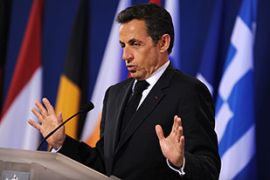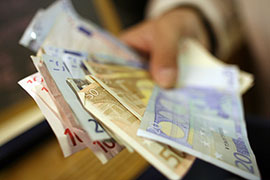EU leaders pledge to defend euro
Eurozone nations create emergency fund to defend currency amid fears of Greek contagion.

Sarkozy said European finance ministers will hold another emergency meeting on Sunday to work out the specifics of the anti-speculators plan.
“We will not let others undo what generations have created,” he said.
An equally combative Merkel said: “We will make use of EU mechanism to protect ourselves against speculation.”
Investor confidence
Besides the emergency fund, which all 16 nations may dip into during times of difficulty, eurozone leaders also proposed reining in national public debt, placing effective sanctions on rule-breakers and intensifying work on crisis management.
The proposals were announced shortly after leaders approved a $145bn European Union-International Monetary Fund deal to pull Greece out of its crippling debt crisis amid fears of a contagion effect.
| in depth | |||||||||||||||||||||||||||||
|
Financial markets have continued to sell off the euro and Greek bonds, even as EU leaders have insisted that the Greek financial implosion is a unique combination of bad management, free spending and statistical cheating that does not apply to other eurozone nations.
Herman Van Rompuy, the EU president, said the current quandary “is about responsibility and it is about solidarity.
“We will face this crisis together,” he said.
Jose Manuel Barroso, the European Commission president, said leaders have pledged to defend the euro “whatever it takes”.
“We came out of our meeting tonight with a clear determination,” he said.
“We will do whatever it takes to safeguard financial stability not only of Greece but of all the euro area.”
Germany, France, Italy, Spain, the Netherlands, Portugal and Belgium had each more or less concluded the required parliamentary and legal manoeuvres before the meeting began.
The meeting, originally called to sign off on a bailout plan for Greece and draw lessons for the future, turned into one of crisis management amid market turmoil.
Beyond immediate measures to protect the euro, several leaders at the meeting said they want to impose punishing budgetary rules, which would force member nations to walk a tight budgetary line and avoid the kind of cheating and overspending that led to Greece’s problems.
European leaders also agreed to consolidate public finances and bring in the European Central Bank to ensure eurozone stability.
‘Sharpen the edge’
Germany’s Merkel said there is a need to “sharpen the edge” of the rules to keep wayward governments in line.
She said the 16 eurozone leaders should also consider changes to the 1992 treaty that laid the groundwork for the shared currency, cautioning that otherwise “it won’t work”.
Steven Keen, a professor of economics and finance at the University of Western Sydney, said the proposed measures will not work and he blamed the 1992 treaty for the current crisis.
 |
| Leaders at the summit also proposed changes in eurozone budgetary rules [GALLO/GETTY] |
“They need to suspend the [1992] treaty. The absurd element of the treaty was that it imposed an impossible limitation upon governments that deficits could never exceed three per cent of [a country’s] GDP,” he told Al Jazeera on Saturday.
“When you have an enormous financial crisis … that plunges government revenue and drastically increases spending on welfare, that pushes countries like Greece, Italy and Spain to go from three per cent to over 10 per cent of their GDP.
“If Greece is able to derail the process, then there is no way you can survive what is going to happen when Italy, Ireland and Spain, in particular, run up against the same limitations of the treaty.”
Sarkozy and Barroso have warned that the debt crisis has now gone beyond Greece itself and affected the very roots of the currency.
Many economists predict that Greece will eventually default, which could deal a sharp blow to the euro and lead to sharply higher borrowing costs for other indebted countries in Europe.
Market contagion
Default, or market contagion to other countries, could lead to panic, intimidating consumers from spending and making banks fearful to lend money to businesses and consumers.
“We are determined to move forward. But there is unprecedented volatility throughout the world, in the world economy,” George Papandreou, the Greek prime minister, said.
Along with the eurozone meeting, the G7 finance ministers and central bankers held a teleconference on the crisis on Friday.
Jim Flaherty, the Canadian finance minister, who chaired the meeting on the Greek debt situation, urged European countries to move quickly with a strong response.
“The sooner the better. The key is that we move toward a resolution. This has to be resolved. It cannot go on indefinitely,” he said, adding that further discussions will be held.
“Every one understands the need for a clear, timely and strong response.”
